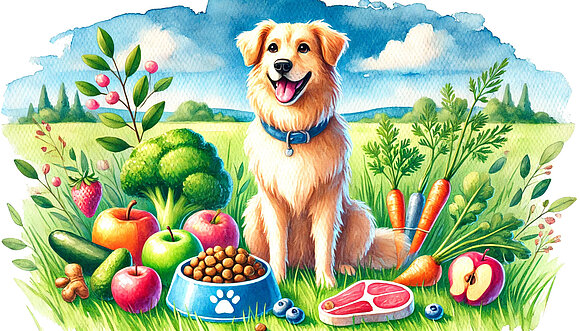The right diet for your dog: tips and tricks

The basics of dog nutrition
1 The five essential nutrients
A balanced diet for your dog consists of five essential nutrients:
- Proteins: Important for muscle building and tissue repair. Meat, fish and eggs are excellent sources of protein.
- Fats: Provide energy and support the absorption of fat-soluble vitamins. High-quality oils such as salmon oil and chicken fat are good sources of fat.
- Carbohydrates: Main source of energy. Wholemeal products and vegetables are recommended sources of carbohydrates.
- Vitamins: Essential for the immune system and general health. Fresh fruit and vegetables are rich in vitamins.
- Minerals: Support various bodily functions. Mineral-rich foods such as bone meal and certain vegetables are ideal.
2. industrially produced food vs. home-cooked food
Both types of food have their advantages and disadvantages. Prepared food is convenient and often well-balanced, while home-cooked food offers more control over ingredients and quality. It is important that you ensure the right balance of nutrients in home-cooked food.
Choosing the right food
1. dry food, wet food or BARF?
- Dry foodLong shelf life and practical. Look for high-quality ingredients and a high meat content.
- Wet foodHigher moisture content, which is particularly beneficial for dogs that drink little. The meat content should also be high here.
- BARF (Biologically Appropriate Raw Food)A form of nutrition based on raw meat and natural ingredients. It requires careful planning to avoid nutritional deficiencies.
2. food adapted to age and size
Dogs have different needs depending on their age and size:
- Puppy food: rich in proteins and fats for growth.
- Adult food: Balanced nutrient distribution for adult dogs.
- Senior food: Adapted to the lower energy requirements and special needs of older dogs.
- Size-adapted food: Smaller kibbles for small breeds and larger pieces for larger dogs.
Individual needs of your dog
1. allergies and intolerances
Many dogs suffer from allergies or intolerances. Typical triggers are grains, certain types of meat or additives. Watch out for symptoms such as itching, gastrointestinal problems or skin rashes and consult your vet if you suspect anything. There are special hypoallergenic foods that are suitable for such cases.
2. special nutritional requirements
Some dogs need special food due to illness or special circumstances. This includes, for example, diet food for overweight dogs or kidney diet food for dogs with kidney problems. Your vet can give you the best recommendations.
Tips and tricks for a healthy dog diet
1. feeding times and quantities
- Regular meals: Feed your dog 2-3 times a day at fixed times.
- Portion sizes: Pay attention to the recommended amount of food on the packaging and adjust it to your dog's activity and condition.
2. water intake
- Always fresh water: Make sure your dog has access to fresh water at all times. Change the water at least once a day.
3. treats and snacks
- Healthy treats: Use natural snacks such as carrots, apple slices or special dog cookies. Avoid sugary or highly processed treats.
- Moderate use: Don't overdo it with the treats, as they often contain extra calories.
4. watch your dog
Pay attention to your dog's behavior and health. Coat quality, energy levels and bowel movements can provide clues to the right diet. Always consult a vet if there are any uncertainties or problems.
Conclusion
The right diet is an essential part of dog health. By taking your dog's needs into account and ensuring a balanced nutrient intake, you are laying the foundations for a happy and healthy life for your four-legged friend. Experiment with different types of food, stick to the principles of dog nutrition and don't hesitate to seek advice from an expert if you have special needs. Your dog will thank you with health and vitality!
More articles for you
Contact form problem fixed
Unfortunately, our contact form has not worked as desired in recent weeks. 😔 Due to an error in the spam detection, normal messages were also incorrectly filtered out.Read moreDangerous encounter: What you should do if your dog is bitten by a snake
It's every dog owner's nightmare: you're out in nature with your four-legged friend, he's sniffing the ground curiously, and suddenly you hear a hissing sound. Before you know it, your dog flinches and you recognize the signs of a snake bite. But don't panic! In this article, you will learn how to…Read moreWhat you should know about cherries for dogs
You may have heard that cherries are good for your health. They contain lots of vitamins, antioxidants and fiber, which can strengthen the immune system and aid digestion. But are cherries also suitable for dogs? And if so, how much and in what form should you offer them to your four-legged friend?…Read more


